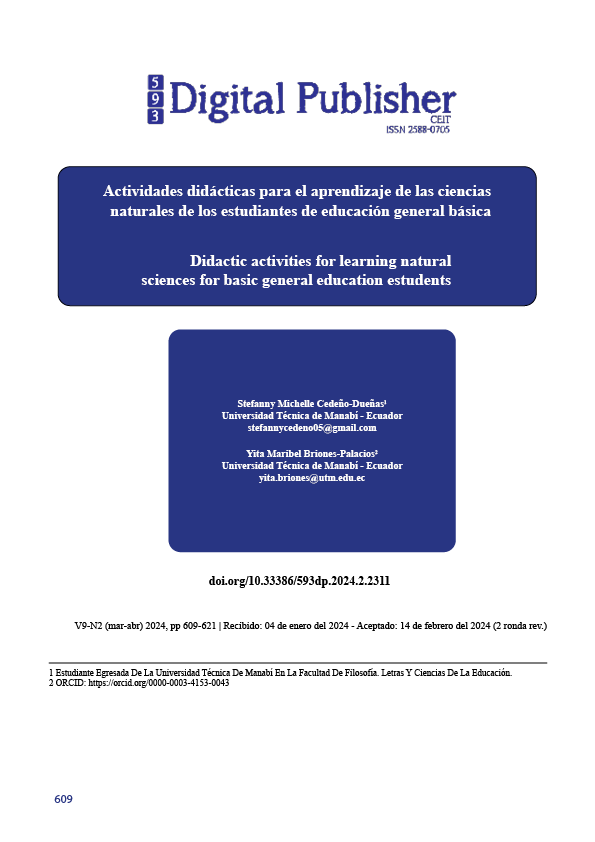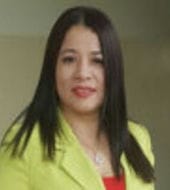Didactic activities for learning natural sciences for basic general education estudents
Main Article Content
Abstract
In the teaching and learning of Natural Sciences, it is essential to motivate oneself to acquire skills that give way to new teaching dynamics, new paradigms, pointing out the importance of this area. In this sense, the objective of the present study was: to design a didactic strategy to improve learning in Natural Sciences in Basic General Education students of the 24 de Julio Educational Unit. It had a quantitative approach. The methods used were the following: empirical, statistical and bibliographic. The techniques were the survey. The population of this institution is 32 teachers and 434 students. The sample was obtained from 4 teachers who teach this subject, 18 students from one course. The results obtained indicated that the basic general education students of this educational unit acquire the learning of this subject through the school text, but they do not carry out any type of experimental practices. It is concluded that the lack of didactic strategies for the teaching and learning of natural sciences is not being applied where environmental practices are included.
Downloads
Article Details

This work is licensed under a Creative Commons Attribution-NonCommercial-ShareAlike 4.0 International License.
1. Derechos de autor
Las obras que se publican en 593 Digital Publisher CEIT están sujetas a los siguientes términos:
1.1. 593 Digital Publisher CEIT, conserva los derechos patrimoniales (copyright) de las obras publicadas, favorece y permite la reutilización de las mismas bajo la licencia Licencia Creative Commons 4.0 de Reconocimiento-NoComercial-CompartirIgual 4.0, por lo cual se pueden copiar, usar, difundir, transmitir y exponer públicamente, siempre que:
1.1.a. Se cite la autoría y fuente original de su publicación (revista, editorial, URL).
1.1.b. No se usen para fines comerciales u onerosos.
1.1.c. Se mencione la existencia y especificaciones de esta licencia de uso.
References
Risco, E. (2021). Los entornos virtuales de gamificación orientados al aprendizaje de los compuestos inorgánicos binarios. Máster Universitario en Tecnología Educativa y Competencias Digitales. Universidad Internacional de La Rioja.
Castillo, E. & Chicaiza, E. (2020). Propuesta metodológica participativa para la construcción de una guía didáctica orientada a la enseñanza-aprendizaje de la asignatura de Ciencias Naturales en el Octavo Grado de EGB en la Unidad Educativa Molleturo. Universidad Nacional de Educación. http://repositorio.unae.edu.ec/bitstream/56000/1644/1/a.%20Documento%20%20Trabajo%20de%20Integraci%c3%b3n%20Curricular.pdf.
Díaz-Delgado, N. (2018). Gamificar y transformar la escuela. https://rua.ua.es/dspace/bitstream/10045/76608/6/ReMedCom_09_02_19.pdf.
Pérez Narváez, D. L. (2021). Gamificación en la enseñanza de la separación en la fuente de residuos sólidos para incrementar el grado de aprendizaje de esta temática en el sector agroindustrial del centro Lope, Sena regional Nariño.
Hueso, A., & Cascan, M. J. (2012). Metodología y técnicas cuantitativas de investigación. Cuadernos docentes en procesos de desarrollo. Editorial UNIVERSITAT POLITÈCNICA DE VALÈNCIA.
Ríos, F. T. (2017). Ensayo sobre el uso de la encuesta: hermenéutica y reflexividad de la técnica investigativa. Revista Austral de Ciencias Sociales, (8), 17-27. http://revistas.uach.cl/pdf/racs/n8/art02.pdf.
Zambrano, A. (2021). Estrategias de gamificación para motivar el desarrollo de las competencias medioambientales de los estudiantes de la Unidad Educativa Fiscal “Arturo Mendoza”. Trabajo de Fin de Master. Universidad Europea.
Noro, J. (2019). Obsolescencia y obsolescencia programada: de los artefactos a la existencia humana, la vida y las relaciones. Versión digital: https://www.academia.edu/41376462/175_OBSOLESCENCIA_PROGRAMADA_DE_LOS_ARTEFACTOS_A_LA_EXISTENCIA_HUMANA.
Noro, J. (2018). Filosofía nueva antropología para la educación del presente y del futuro. Versión digital. https://www.academia.edu/38046498/143_FILOSOFIA_UNA_NUEVA_ANTROPOLOGIA_PARA_UNA_NUEVA_EDUCACION
González Cabanach, R., Fernández Suárez, A. P., Cuevas González, L. M., & Valle, A. (1998). Las estrategias de aprendizaje. Características básicas y su relevancia en el contexto escolar. https://addi.ehu.es/bitstream/handle/10810/48047/87-148-1-PB.pdf?sequence=1&isAllowed=y.
Sprock, A. S. (2018). Conceptualización de los modelos de estilos de aprendizaje. Revista de estilos de aprendizaje, 11(21). https://revistaestilosdeaprendizaje.com/article/view/1088/1809
Ministerio de Educación (2018), “Manual de Buenas Prácticas Ambientales para Instituciones Educativas”. Primera edición, Quito-Ecuador. https://educacion.gob.ec/wp-content/uploads/downloads/2018/02/Manual-BPA.pdf
Navarra, J. M. (2001). Didáctica: concepto, objeto y finalidades. Didáctica general para psicopedagogos. Universidad Nacional de Educación a Distancia, UNED, 57.



